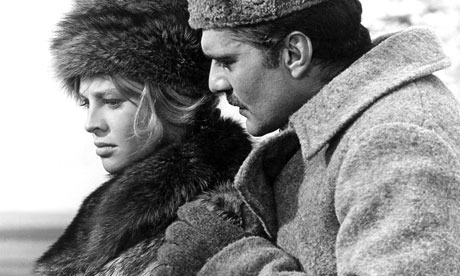The History Book Club discussion

This topic is about
Doctor Zhivago
RUSSIA
>
INTRODUCTION - DR ZHIVAGO - HF (SPOILER THREAD)
date newest »
newest »
 newest »
newest »
message 2:
by
Bentley, Group Founder, Leader, Chief
(last edited May 08, 2012 10:59PM)
(new)
-
rated it 5 stars
How the Kremlin strove to block Dr Zhivago by John Hooper in The Guardian
The lengths to which the Soviet authorities were ready to go in their efforts to block publication of Boris Pasternak's epic novel about 20th-century Russia, Doctor Zhivago, was revealed by a letter published yesterday.
After the book was rejected by the authorities, Pasternak passed his manuscript to the leftwing Italian publisher Giangiacomo Feltrinelli, who had it translated and printed in the west. It appeared in November 1957.
But since then, literary historians have speculated on the author's behaviour between delivery and publication. In messages to those involved in what was to be the literary coup of the century, Pasternak called for publication to be suspended.
Feltrinelli, who died in 1972, insisted it was his duty to ignore Pasternak's appeals for a postponement because they had been issued under duress.
Perhaps the most compelling appeal was sent to the Italian translator Pietro Zveteremich on September 19 1957. "I have come to the profound conviction that what I wrote cannot be regarded as a finished work," the author wrote in a telegram. Zhivago was the "preliminary draft of a future work" that was "in need of serious improvement".
But in a scribbled note to Zveteremich, dated June 25 1957, published yesterday by Corriere della Sera, Pasternak conveyed his true feelings. Foreign publishers, he said, "must not hold back from publishing for fear of harming me. I wrote the novel to be published and read. That remains my only wish".
It is not clear what means the security services used to make Pasternak sign the September telegram, but in a letter to a fellow writer that December he said he had been put under "moral pressure, repulsive in its duplicity".
Corriere said Zveteremich later returned the note to the Pasternak family. It is expected to be published in a volume of the writer's collected letters.
Doctor Zhivago became a bestseller in 24 languages and earned Pasternak a Nobel prize, which he was forced to refuse.

Julie Christie and Omar Sharif in the film version of Dr Zhivago. Photograph: Sportsphoto Ltd. / Allstar
The lengths to which the Soviet authorities were ready to go in their efforts to block publication of Boris Pasternak's epic novel about 20th-century Russia, Doctor Zhivago, was revealed by a letter published yesterday.
After the book was rejected by the authorities, Pasternak passed his manuscript to the leftwing Italian publisher Giangiacomo Feltrinelli, who had it translated and printed in the west. It appeared in November 1957.
But since then, literary historians have speculated on the author's behaviour between delivery and publication. In messages to those involved in what was to be the literary coup of the century, Pasternak called for publication to be suspended.
Feltrinelli, who died in 1972, insisted it was his duty to ignore Pasternak's appeals for a postponement because they had been issued under duress.
Perhaps the most compelling appeal was sent to the Italian translator Pietro Zveteremich on September 19 1957. "I have come to the profound conviction that what I wrote cannot be regarded as a finished work," the author wrote in a telegram. Zhivago was the "preliminary draft of a future work" that was "in need of serious improvement".
But in a scribbled note to Zveteremich, dated June 25 1957, published yesterday by Corriere della Sera, Pasternak conveyed his true feelings. Foreign publishers, he said, "must not hold back from publishing for fear of harming me. I wrote the novel to be published and read. That remains my only wish".
It is not clear what means the security services used to make Pasternak sign the September telegram, but in a letter to a fellow writer that December he said he had been put under "moral pressure, repulsive in its duplicity".
Corriere said Zveteremich later returned the note to the Pasternak family. It is expected to be published in a volume of the writer's collected letters.
Doctor Zhivago became a bestseller in 24 languages and earned Pasternak a Nobel prize, which he was forced to refuse.

Julie Christie and Omar Sharif in the film version of Dr Zhivago. Photograph: Sportsphoto Ltd. / Allstar




Dr. Zhivago
Synopsis from The Guardian:
From Russia with tragedy
Ben Cooper on Doctor Zhivago by Boris Pasternak
Boris Pasternaks's 1958 Nobel Prize-winning novel of ill-starred love is told with a mournful musicality and set within bleak, wind-swept panoramas.
Pasternak movingly casts the eponymous doctor as a figure of inevitable tragedy and suffering, surpassed only by the plight of revolutionary Russia itself.
His beautiful, poetic style serves to compound the sense of pathos as Yury Zhivago fails to resolve his love for two women - Lara and his wife, Tonya - in the brooding landscape of a Russia struggling to come to terms with the upheaval it is undergoing. The richness of the love story is counteracted by the emotional vacuum of the new body politic.
Elegant descriptive passages help to create a captivating historical overview of the bourgeoisie's plight under the Bolsheviks, while strong hints of a narrative voice are evident throughout as the doctor struggles to mask his horror at the brutality of the new order
Dr Zhivago found its way into the public consciousness in the late Fifties, acquiring the mantle of greatness as a result of its epic, yet peculiarly human themes. It is now firmly established as a twentieth-century masterpiece.